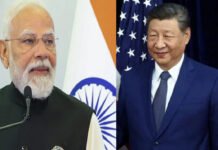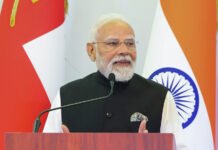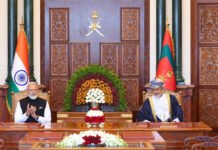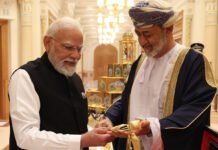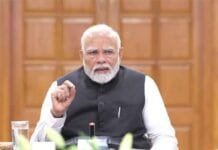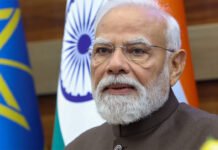INVC NEWS
Dushanbe – : The mounting evidence and growing global awareness reveal how Pakistan’s persistent support for terrorism is undermining the very foundation of the Indus Water Treaty (IWT). At the historic United Nations Glacier Conference in Dushanbe, India made a powerful diplomatic statement before 80 countries and 70 international organizations, calling out Pakistan’s attempts to politicize the issue while being the actual violator.
Terrorism: The Real Violation of the Indus Water Treaty
India has officially stated that cross-border terrorism emerging from Pakistani soil is the biggest challenge to implementing the IWT, originally established to ensure peaceful water-sharing. Minister of State for Environment, Kirtivardhan Singh, firmly declared that Pakistan itself is breaking the treaty by enabling terrorism, while falsely blaming India. His remarks came during a plenary session, sending a clear message that security and cooperation cannot coexist with state-sponsored terror.
India Rejects Politicization of UN Glacier Summit
During the UN summit, where environmental concerns and glacial melt were meant to take center stage, Pakistan’s Prime Minister Shahbaz Sharif diverted attention, issuing politically charged accusations against India. The Indian delegation, however, exposed this misuse of platform, stating, “We are shocked by Pakistan’s attempt to introduce irrelevant issues. We strongly condemn this move.”
UN Glacier Conference: A Global Audience to India’s Stand
The three-day conference in Tajikistan featured over 2,500 participants from 80 member nations and 70 global institutions. At this prestigious platform, India detailed how Pakistan’s narrative lacks credibility in the face of its own terrorist infrastructure. While Islamabad claimed India is threatening millions by allegedly suspending the treaty, India revealed the true threat: terrorism disguised as diplomacy.
India Asserts Treaty Needs Reassessment Amid New Realities
India emphasized that since the IWT was signed in 1960, the world has changed dramatically. Population growth, technological evolution, climate emergencies, and ongoing terror threats have rendered many original treaty assumptions obsolete. Minister Kirtivardhan Singh underlined that a treaty’s relevance must be reviewed when one signatory continuously destabilizes the region.
Zero Tolerance Policy: India’s Strategic Approach to Terror
India’s zero tolerance policy toward terrorism has become an international doctrine. Prime Minister Narendra Modi has repeatedly affirmed that terrorist acts will be treated as acts of war. India has vowed that there will be no compromise on national security, and any breach—whether through violence or diplomacy—will be answered decisively.
Global Campaign: India Rallies World Against Pakistan-Sponsored Terrorism
As part of its global diplomatic strategy, India formed seven all-party delegations tasked with exposing Pakistan’s support for terrorism. These delegations have visited key nations including Russia, Japan, UAE, Qatar, and Guyana, presenting intelligence and evidence before international stakeholders. Their objective is clear: to isolate terror sponsors and reinforce global security alliances.
Pakistan’s Propaganda Efforts Crumble Against Facts
Following the April 22 massacre of 26 tourists in Pahalgam, Pakistan ramped up its propaganda machinery, portraying itself as a victim while shielding the perpetrators. However, India’s multi-layered diplomatic push has discredited these false narratives. Indian MPs from all major political parties have spoken in unity, highlighting Pakistan’s duplicity and reaffirming India’s commitment to rooting out terrorism.
India’s Cross-Party Unity: A Strong Message to the World
What makes India’s campaign even more powerful is the unprecedented political unity on the issue of terrorism. MPs from across the political spectrum have taken the same stand internationally, emphasizing that Pakistan’s actions endanger peace, violate treaties, and manipulate platforms designed for cooperative dialogue. This bipartisan approach is a testament to the national importance of exposing Pakistan’s agenda.
Indus Water Treaty No Longer Immune to Reality of Terrorism
The IWT was created to be an apolitical agreement, focused solely on equitable water sharing. However, when one party uses water, peace talks, and international forums as tools for diversion while breeding terror, the integrity of such agreements comes under question. India is no longer willing to overlook terrorism for the sake of maintaining an outdated treaty that no longer reflects current geopolitical dynamics.
World Leaders Witness India’s Diplomatic Clarity at UN Summit
By clearly and publicly highlighting the nexus between terrorism and treaty violations, India ensured that Pakistan’s dual role—claiming victimhood while perpetuating violence—was exposed on a global stage. Delegates from dozens of countries now understand that the real threat to regional stability comes not from India’s water policy, but from Pakistan’s terror policy.
India Emerges as Voice of Reason and Regional Stability
India’s powerful presence and well-articulated position at the UN Glacier Conference not only countered Pakistan’s misinformation but also repositioned India as a responsible regional actor, working toward sustainable development, peace, and global cooperation. Pakistan’s narrative fell apart under international scrutiny, and the world took note of the ground realities in South Asia.
Rewriting the Indo-Pak Narrative: From Water Disputes to Terror Accountability
Search trends, geopolitical discussions, and global policy shifts now increasingly reflect India’s consistent messaging: terrorism must be treated as a global concern, not a bilateral dispute. As the diplomatic campaign continues, India’s leadership in calling out treaty violations rooted in terrorism will shape future Indo-Pak dialogues and international responses.


